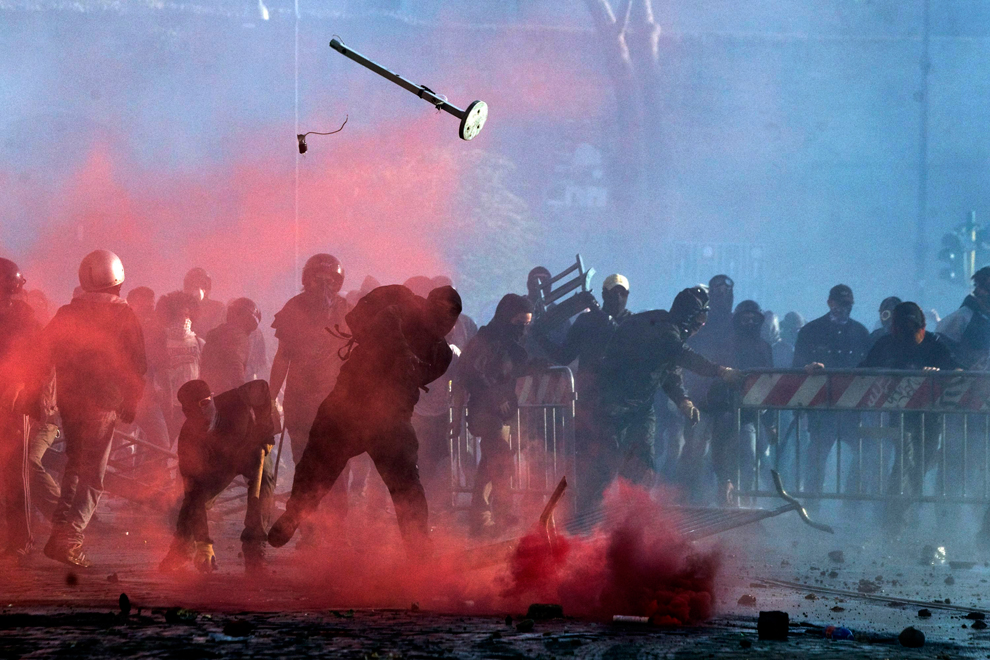There are many ways to demonstrate solidarity to comrades who are being criminalised by the State, each one of which is a direct expression of the way one intervenes in the social clash in general.
There are those who see solidarity as lending a social service to this or that arrested comrade, and that is the way they carry out their activity: looking for lawyers, sending money and clothes to prison, visiting and so on. This purely humanitarian solidarity also translates itself into the constitution of defence committees and relative campaigns aimed at influencing public opinion.
Then there are those who see solidarity in a strictly political key and play at making a heap of “distinctions” aimed at not compromising the image of their own activity. So for reasons of opportunity they defend and show solidarity to those who declare themselves innocent, not to those who Claim responsibility for their actions.
Others still, if they see there is something to be gained in terms of political propaganda, immediately bring out flyers and leaflets in formal solidarity with the comrade or comrades arrested, i.e. they declare solidarity in words, while in practice there is no trace of it.
Then there is solidarity in an ideological context. This is the case of the marxist-leninists in the revolutionary combatant party version. They show solidarity with those with positions similar to their own, and are in contrast with those who do not share or recognise their political line or strategy, often using censorship and ostracism against those they consider inconvenient.
What do we think we should mean by revolutionary solidarity then? The first aspect is that of seeing solidarity as the extension of the insurrectional social practice one is already carrying out within the class clash, i.e. as a direct demonstration of actions of attack against all the structures of power, large and small that are present in one’s own territory. And that is because these should to all effects be considered responsible for everything that happens in social reality, including therefore the criminalisation and arrest of comrades wherever they are. It would be short-sighted to reduce the question of repression against comrades to something strictly linked to the legal and police apparatus. The criminalisation and arrest of comrades should be seen in the context of the social struggle as a whole, precisely because these are always the hasty material means used by the State to discourage radicalisation everywhere. No matter how great or insignificant it might be, every act of repression belongs to the relations of the social struggle in course against the structures of dominion.
The second aspect is that each revolutionary comrade should be defended on principle, irrespective of the accusations made against them by the State’s legal and police apparatus, in the first place because it is a question of snatching them from its clutches i.e. from the conditions of “hostage” they have been reduced to. Moreover, it is also a question of not losing the occasion to intensify the attack against the “law” intended as the regulating expression of all the relationships of power present in constituted society.
The third aspect concerns the refusal to accept the logic of defence that is inherent in constitutional law, such as for example the problem of the “innocence” or “guilt” of the comrades involved, and that is because we have many good reasons for defending them and no one can justify the political opportunism of not doing so. We cannot and must not consider ourselves lawyers, but revolutionary anarchists at war against constituted social order an all fronts. We aim at radically destroying the latter from top to bottom, we are not interested in judging it as it does us. For this reason we consider any sentence made by the State vultures against proletarians in revolt, and all the more so if they are comrades, to be a sentence against ourselves and as such to be avenged with all the means we consider opportune, according to our disposition and personal inclinations.
The fourth and final aspect concerns our attitude towards the arrested comrades, whom we continue to behave towards in the same way as those not in prison. That means that to revolutionary solidarity we always and in any case unite a radical critique. We can and do show solidarity with imprisoned comrades without for this espousing their ideas. Those who show solidarity to imprisoned comrades are not necessarily involved in their opinions and points of view, and the same thing goes for us as far as they are concerned. We actively support all imprisoned comrades in all and for all, but only up to the point where what we do for them does not come into contrast with or contradict our revolutionary insurrectionalist way of being. Ours is exclusively a relationship between social revolutionaries in revolt, not that of bartering positions. We do not sacrifice any part of ourselves, just as we do not expect others to do the same.
We think of solidarity as a way of being accomplices, of taking reciprocal pleasure and in no way consider it a duty, a sacrifice for the “good and sacred cause”, because it is our own cause, i.e. ourselves.
Starting from these premises, of primary importance in the development of one’s anarchist insurrectionalist action, revolutionary solidarity takes on meaning as such, because we would show simple material support to any friend who ends up in prison.
Revolutionary solidarity is an integral part of our very being as insurrectional anarchists. It is in this dimension that it should be demonstrated incessantly, precisely because it contributes to widening what we are already doing.
Pierleone Porcu

